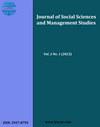女性与情感的变化:泰戈尔《巴厘乔克》中“阿莎-比诺迪尼”微妙情结的解读
引用次数: 0
摘要
妇女经常从许多社会代表性的实践中被派往她们缺席标记的主体职位;他们被塑造成缺乏政治代表的“主体”。这样的女权主义在印度地理上没有明确的开始策略,除了一些人抗议社会规则,要求为女性提供平等的空间。在可以被视为女权主义作品的印度英语文学领域,我们确实有杰出的贡献人物,如Mahasweta Devi, Jhumpa Lahiri等等。文化在塑造和维持身份方面发挥着基础主义的作用,这样的孟加拉文化也将女性创造为一个独立的实体,通过语言缺失的几个“固定”特征来定义。在这方面,朱迪思·巴特勒(Judith Butler)说得很好:“女人是一种不“一”的性别。”在……以生殖器为中心的语言中,女性构成了不可代表的……女性代表了无法被思考的性别,一种语言的缺失和不透明”(Butler, 13)。泰戈尔的文学作品通常被称为女权主义作品,因为它们建设性地解构了复杂的文化耻辱。泰戈尔对女性的描绘既具有颠覆性,又充满文化活力,很少占主导地位;虽然很少被主导,但我的论文将尝试通过应用酷儿-后结构主义女权主义理论来辨别。本文章由计算机程序翻译,如有差异,请以英文原文为准。
Women and Emotional Variabilities: Reading of the Delicate Complexes ‘Subjecting Asha-Binodini’ in Tagore’s Chokher Bali
Women have often been deployed from many social representational practices for their absently marked subject positions; they have been made to function as the ‘subjects’ of absent political representations. Feminism as such had no pinpointed strategy of commencing in Indian geography, except for personalities protesting against social rules to demand equal spaces for the women. In the field of Indian English Literature that can be considered as feminist writings, we indeed have remarkable contributing personalities like Mahasweta Devi, Jhumpa Lahiri, and many more. Culture functions as a foundationalist fable in shaping identities and sustaining them, and such Bengali culture has also created women as a separate entity definable by few ‘fixed’ characteristics of linguistic absence. In this regard Judith Butler beautifully stated that “Women are the sex which is not “one”. Within…a phallogocentric language, women constitute the unrepresentable…women represent the sex that cannot be thought, a linguistic absence and opacity” (Butler, 13). Rabindranath Tagore’s literary pieces has often been called feminist works for they constructively deconstructed the intricate cultural stigmas. Tagore’s presentation of women was both subversive and culturally vibrant, few dominated; while few were dominated, which my paper would try discerning by the application of queer-post-structuralist feminist theory.
求助全文
通过发布文献求助,成功后即可免费获取论文全文。
去求助
来源期刊

Journal of Social Sciences and Management Studies
Social Sciences and Management Studies-
自引率
0.00%
发文量
0
期刊介绍:
Journal of Social Sciences and Management Studies (ISSN: 2957-8795) is a peer reviewed journal focuses on integrating theory, research and practice in the area of management and social sciences. The journal discusses the distinctive disciplinary practices within the sciences of the management and social field and examines examples of these practices. In order to define and exemplify disciplinarity, the journal fosters dialogue ranging from the broad and speculative to the microcosmic and empirical. In considering the varied interdisciplinary, trans-disciplinary or multidisciplinary work across and between the social, natural and applied sciences, the journal showcases interdisciplinary practices in action. The focus of papers ranges from the finely grained and empirical, to wide-ranging multi-disciplinary and transdisciplinary practices, to perspectives on knowledge and method.
 求助内容:
求助内容: 应助结果提醒方式:
应助结果提醒方式:


